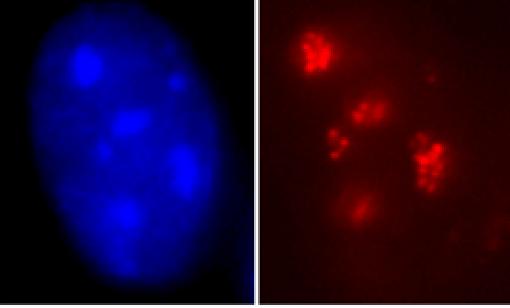Dr. Eran Mashorer from the Hebrew University and his international team of scientists were able to prove that differentiation into a certain cell type is followed by the silencing of genes that are not relevant to this particular cell

Embryonic stem cells are primary cells of the embryo that are created on the fourth day of its development, and are able to differentiate, according to the environment in which they will be, into cells from different tissues (such as: skin cells, bone cells, blood system cells, etc.). The mechanism responsible for the ability of a cell to develop into any cell of the body, due to it not being "programmed" in advance for a certain type of cells, is largely unknown. Dr. Eran Mashorer from the Faculty of Natural Sciences at the Hebrew University, who collaborated with several research groups from around the world, was able to answer one of the main questions that preoccupy researchers in the field today - what is the manner in which stem cells differentiate.
It is known that all body cells contain the same genes. The differences between the cells arise from the fact that in each type of cell a different series of genes is "expressed" (gene expression means the creation of the protein intended for that gene).
Theoretically, there are two possibilities for the differentiation of stem cells: one - the stem cell will from the beginning exclusively express the genes it needs for the final differentiation; And the second - the stem cell will express many genes indiscriminately and while differentiating it will suppress the expression of genes that are not required. Today, one of the main questions that preoccupy researchers in the field is how the stem cells differentiate.
Dr. Eran Meshorer discovered that stem cells express a very rich variety of genes, most of which are supposed to appear only in mature cells. In his research, Dr. Mashorer was able to prove that differentiation into a certain cell type is followed by the silencing of genes that are not relevant to this particular cell. Also, extensive parts of DNA are expressed in the stem cells which are silenced in other types of cells. That is, it can be said that stem cells reserve the right to decide at the last moment what type of cells they will differentiate into.
The research group included: Sol Efroni, Tom Mistley, Ronald McKay, Stuart LeGrice and Kenneth Buteau from the National Institutes of Health (NIH) in the USA, Thomas Gingeras from the company that manufactures the DNA chips Aphimatrix and David Buzzett-Jones From Children's Hospital, Toronto, Canada. Dr. Eran Mashorer's article was published this weekend in the prestigious scientific journal Cell Stem Cell.
To carry out the research, the scientists used DNA chips containing the entire mouse genome. DNA chips are small glasses that allow the simultaneous detection of thousands of genes. The chips in the study were not limited to identifying genes only, but contained sequences corresponding to the entire genome, which mostly contains sequences that do not code for proteins and whose function is unknown.

3 תגובות
The definition of differentiation is that the differentiated cell expresses only a certain set of genes. There are two ways to reach this state: to activate the certain genes during stem cell differentiation, or to silence in the stem cell the expressions of genes that are not related to the function of the differentiated cell.
The research showed that the second way is the one that does happen. That is, many genes are expressed in the stem cell, and most of them are silenced during differentiation
The wording here is so careful that the discovery is not clear enough. According to the wording in the article:
"...differentiation into a certain cell type is followed by the silencing of genes that are not relevant to this particular cell." But it seems to me that this is exactly the definition of differentiation, after all, this is the proposed point of the discussion, that is, sorted cells are cells in which only a small group of genes is expressed and the rest of the genes are not expressed.